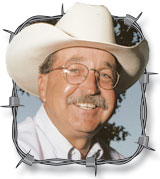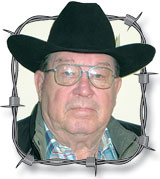 I was about 10-years-old when my father allowed me to cut hay by myself for the first time. It was a field of alfalfa on the southeast corner of our creek-bottom farm and Dad had mowed a few rounds while I rode along, as I had for hundreds of hours before, to review everything I should need to know. When he left me alone with the tractor and sickle-bar mower, to go work on another project, I knew I was a man.
I was about 10-years-old when my father allowed me to cut hay by myself for the first time. It was a field of alfalfa on the southeast corner of our creek-bottom farm and Dad had mowed a few rounds while I rode along, as I had for hundreds of hours before, to review everything I should need to know. When he left me alone with the tractor and sickle-bar mower, to go work on another project, I knew I was a man.
After just a couple of solo rounds, I ran into problems as the crop began to look a little different with some viny, purple-flowered plants that would plug the mower, requiring me to back up every little bit, to unclog the mower. At its worst, I would have to shut off the PTO and manually dig the plants out of the mower guards. At best, I could only go about 10 feet, before it would reclog. I’m pretty sure that is the first time, in my short life, that I ever cursed – and I did quite a lot of it that day, until I finally made enough rounds to escape the patch of tangled mess.
I would find out later that the plant was hairy vetch and had probably washed into the field via the frequent floods that we endured in that creek-bottom field. All I know for sure is that for the next few years, we hoed, plowed, sprayed, hand-pulled and cursed those disgusting plants until the alfalfa eventually played out and we sowed it to pastureland. It would have been no match to today’s disc mowers, but it was impossible to mow with a 6-foot McCormick-Deering in 1962.
We sold that farm in 1972, but I have always considered that farm to be my “home” and my home experienced the most devastating flooding in history this past spring.
Last weekend, my wife and I traveled the hundred miles, to my old home, to survey some of the damages we’d been seeing and hearing about on the news. The reporters, for once, hadn’t exaggerated on the extent of the disaster. We saw bridges washed out, roads destroyed, and rich bottomland soil that had been covered with upland rocks and gravel. It was sad, and I felt sorry for the present owners because we had endured countless floods when we farmed the place and I knew their pain.
As we rounded the curve by the southeast corner of the old farm, I grimaced at the quarter-mile of fence that was completely washed away. Driving a little farther, I stopped the truck and yelled, “Well, I’ll be #$%!@*!”
Shocked, and a little scarred, Judy asked, “What is it?”
I pointed to an area along the road where the fence had washed away.
“The flowing water of that swollen creek took out the fences, but that patch of #$%!@* hairy vetch is still there!” And it was – in the very same spot I had tried to mow 55 years ago.
I’ve heard it said that if a nuclear war destroyed everything on earth, cockroaches would survive and be thriving in a mere 20 years. If that’s true, I’d bet money that they’ll crawl out from under…a hairy vetch plant.






